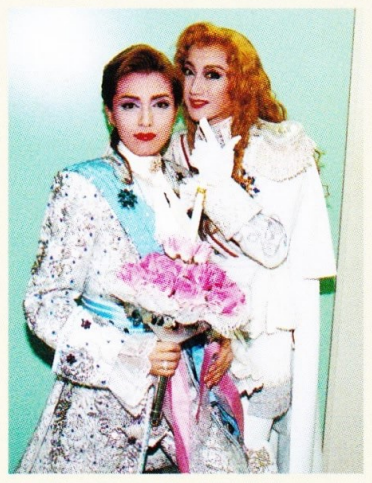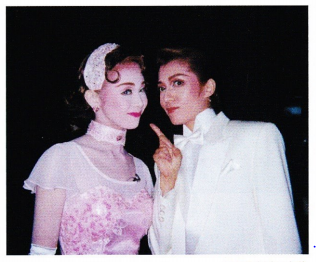This book is a memoir of Aran Kei’s time as a member of Takarazuka, as well as her post-Takarazuka career and memories of her childhood. It was published in 2010 to commemorate the 20th year of her stage career. It also features messages from Takarazuka classmates and other colleagues and theatre artists she has worked with.
Paragraph breaks have been added to make it more readable in English.
“Is it that great to be Top?” My long spell as second supporting star
Although this isn’t something that’s strictly decided, each troupe’s otokoyaku have their own style and aesthetic. In Snow Troupe, where I was, the otokoyaku had a very natural and mature air, but when I transferred to Star Troupe, there was a change in my attitude towards being an otokoyaku. Although you need a natural sort of coolness, you can’t become a full-power otokoyaku with that alone. I started to exaggerate the style I’d picked up in Snow Troupe a bit more.
After 10 years in my stage career I started to hold that attitude, and being an otokoyaku became more and more fun. There are so many different ways to do actions like smoking a cigarette or sitting in a chair, and if you do the move they call the ‘killing glance’, the audience will all react and go ‘Ahhh~!’. I started to find fun in each and every thing like that. I think the reason I was able to keep experimenting through trial and error might have been because I couldn’t become Top Star for a while, and spent a very long time as a second supporting star.
In Takarazuka, the ‘second supporting star’ plays the most important character after the Top Star’s character, and at the same time they are tasked with making the Top Star look even more splendid. However, being able to play villains and comedic roles as second supporting star, characters that could never be the protagonist but who had a ton of individuality, was something I really enjoyed. I feel that those experiences were extremely valuable to me becoming who I am today.

I became the second supporting star of Star Troupe while Minoru Kou was Top Star, and remained second supporting star through the Top runs of Kouju Tatsuki and Kozuki Wataru, three in all. I thought after becoming second supporting star I would be Top Star next, but then I ended up still being second supporting star. That state went on and on, and to be honest, at times I gave up and felt like I would never be able to become Top Star.
While I was in this stalemate situation, continually not becoming Top Star, I sometimes felt like perhaps the company didn’t need me, but instead that turned into motivation for me. No matter what role I was given, I wanted to make it something only Aran Kei could play, so that the company would have to acknowledge me, and in order to do that the only thing I could do was to perform every role perfectly and gain enough skill to become an unshakeable presence. Rather than a desire to become Top Star no matter what, it was those feelings that stirred me, I think.
When I had the lead role in the Chuunichi show Singin’ in the Rain, and when I played Aida and received an award for A Song For Kingdoms, and encountered other roles like that, I started to feel like I would be alright with quitting even if I didn’t become Top Star. The one thing my father told me at that time was ‘keep going until you’ve completely mastered it.’ And to my father, ‘mastery’ was to be at the peak of Takarazuka, to be the Top Star.

However, since I wondered ‘Is being Top really that amazing? Is that so great?’, that didn’t really feel like ‘mastery’ to me. A show isn’t made through one person’s abilities alone, but through everyone’s strengths together, so even if I did become Top, if I kept on with my vague feelings that couldn’t be called ‘mastery’. I ended up at odds with my father over our difference in viewpoint, but that statement made me think about what ‘mastery’ really meant to me personally. I decided I felt like real ‘mastery’ would be to keep going until I was satisfied, rather than trying to get the company to recognize me.
I considered retiring even without becoming top. But as I abandoned, in a way, my attachment to the idea of becoming Top, it was decided that I would become the Top Star of Star Troupe. Since I had been second supporting star for so long, I could feel the expectations of the fans who had watched over me for so long, but in order to not lose sight of what I wanted to do in the future, I tried not to feel too much pressure from this.

But the moment I came down the Grand Stairs for the first time as Top Star, the feeling that welled up in me was ‘I’m so glad everyone is so happy for me!’ Even more than the happiness of finally reaching there, I felt the emotions of everyone who had been waiting for me to arrive, and it felt like I was putting a weight off my shoulders for the first time. Though I was where I had been so wanting to be, even before my own happiness it was seeing everyone’s happy faces that inspired so much joy in me I could barely stand it. It was such a strange feeling.
When, after giving up on it, I ended up as ‘Top’, I felt I would be perfectly happy to retire after one performance. Just by becoming top, I felt more satisfaction than I ever had before, so I had already created a boundary within myself. But everyone around me told me that when I became Top I might see new things and find goals, so my days as Top Star with no particular desires began.
